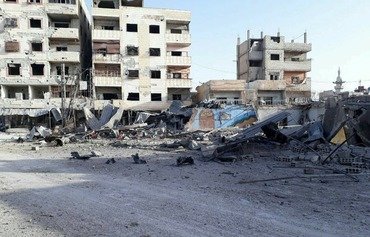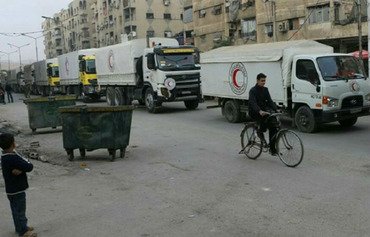The process of evacuating sick and wounded Syrians who are most in need of treatment from Eastern Ghouta to hospitals in Damascus began Tuesday (March 13th) under the supervision of the UN and the Syrian Red Crescent.
Doctors inside the enclave told Diyaruna the first batch of evacuees included patients from Douma only, since it was the faction in control of that city which had conducted the negotiations with the Syrian regime through the UN.
Dr. Anas Abu Yasser, who works in the medical office in Eastern Ghouta's al-Marj sector, told Diyaruna that 35 patients, most of them women and children, were evacuated with their escorts from Douma.
They headed first for al-Wafideen crossing, and from there to hospitals in Damascus, he confirmed.
![One of the ambulances that transported the first batch of patients from Eastern Ghouta to Damascus. [Photo courtesy of Damascus Media Centre]](/cnmi_di/images/2018/03/14/11858-Eastern-Ghouta-ambulance-600_384.jpg)
One of the ambulances that transported the first batch of patients from Eastern Ghouta to Damascus. [Photo courtesy of Damascus Media Centre]
"This was only the first batch scheduled to leave the city pursuant to the UN-sponsored agreement," he said, noting that the agreement called for evacuating a number of cases to other areas as well.
"This evacuation was in the direction of Damascus only," he said.
On Monday, the UN said more than 1,000 people, mostly women and children, were in urgent need of medical evacuations from Eastern Ghouta, AFP reported.
According to the Syrian Observatory for Human Rights, Tuesday's operation brought out 150 civilians from Douma.
Dozens more -- all civilians -- are expected to be evacuated on Wednesday.
A list of 700 names
Medical committees in Douma compiled a list of 700 names of patients who need to be evacuated, Abu Yasser said.
"The lists are being sorted with the Syrian Red Crescent, which decides who is to be transported each day," he added, noting that the selection process will prioritise patients with chronic diseases.
Women and children will be given precedence, followed by the wounded and elderly, he said.
"The agreement includes only sick and wounded civilians in the city of Douma and surrounding areas, since it was struck between Jaish al-Islam and the regime through the UN," he said.
Consequently, the remaining areas are not covered by the agreement as the region now consists of three besieged sections, and Jaish al-Islam controls only one of them.
There is no communication between the UN’s negotiation committees and the groups that control the other two sections: Harasta, which is controlled by Ahrar al-Sham, and the middle section, controlled by Failaq al-Rahman.
A separate agreement has been implemented in Eastern Ghouta that called for more than 60 families who were stuck in the town of Mesraba to be evacuated.
These families have been transported to a sports camp in regime-controlled areas near Damascus, Abu Yasser said.
Urgent medical attention
After a year-long wait, Syrian amputee Ratib Sheikh Bakri left Douma on Tuesday for medical treatment in Damascus that he hopes can save his remaining leg, AFP reported.
After reaching the regime-held al-Wafideen checkpoint on the edge of the opposition enclave, the 56-year-old burst into tears.
His right leg had been amputated near his hip and he had awaited medical evacuation from Douma for a year and a half to seek treatment for the left.
"I am coming to be treated in Damascus before my second leg goes too," he said. But his three daughters and two sons were still trapped inside Douma, under siege and bombardment.
At al-Wafideen, crowds of evacuated people arrived at a makeshift collection point at a school, with many wearing multiple layers of winter coats, as if trying to pack as many clothes with them as possible.
For those left behind, conditions remain dire.
Some 125,000 children are trapped in Eastern Ghouta, many of them acutely malnourished, UN Deputy High Commissioner for Human Rights Kate Gilmore warned Tuesday.

![Sick children from Eastern Ghouta are helped into an ambulance to be transported to Damascus for treatment. [Photo courtesy of Damascus Media Centre]](/cnmi_di/images/2018/03/14/11857-Eastern-Ghouta-evacuees-600_384.jpg)





